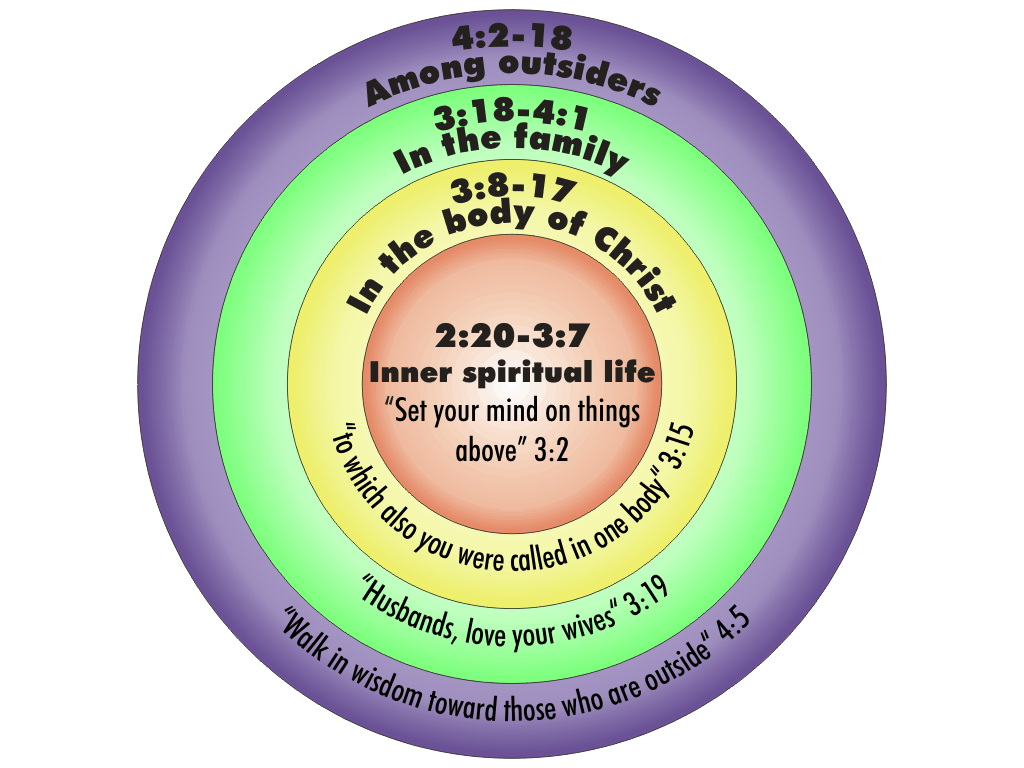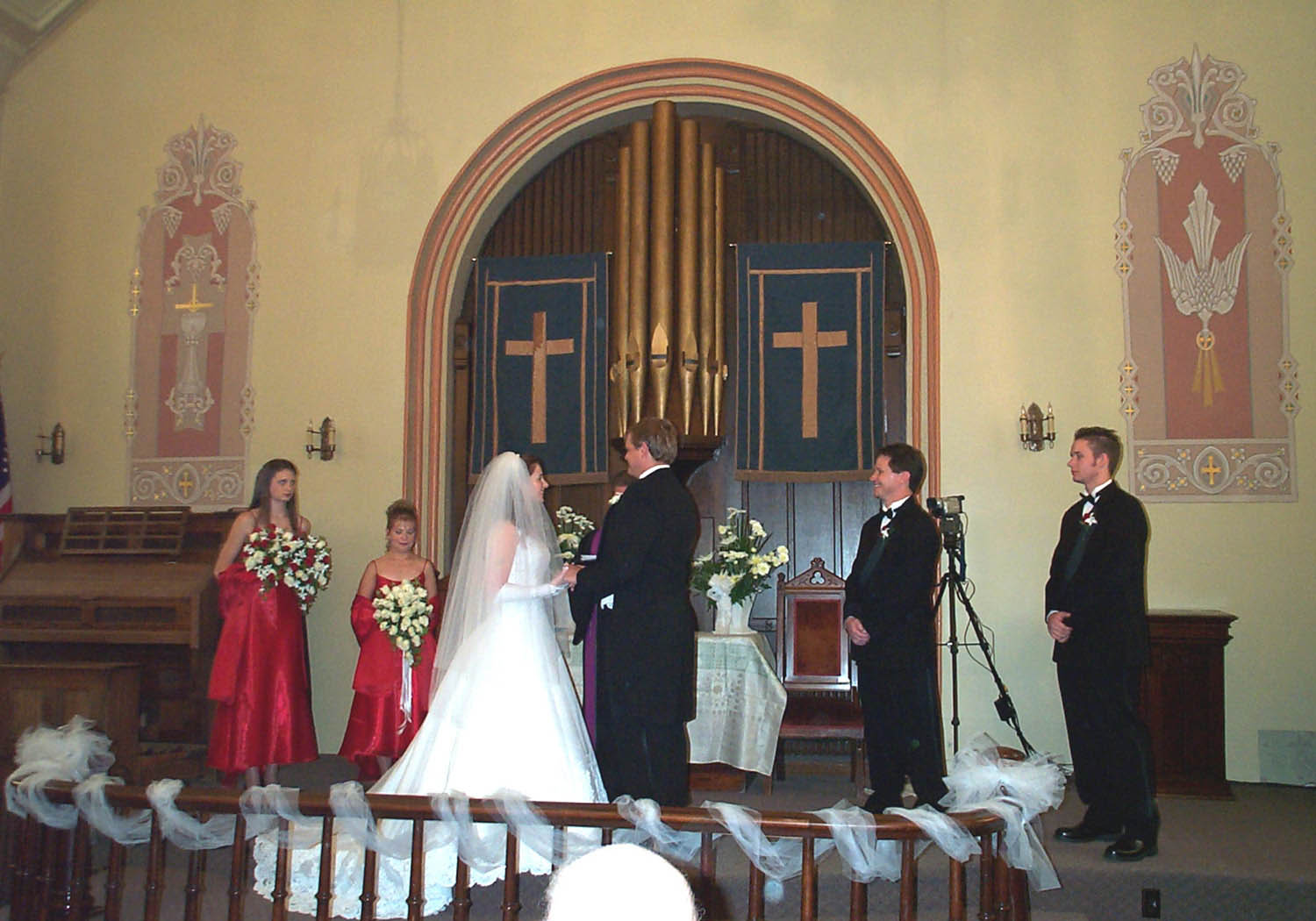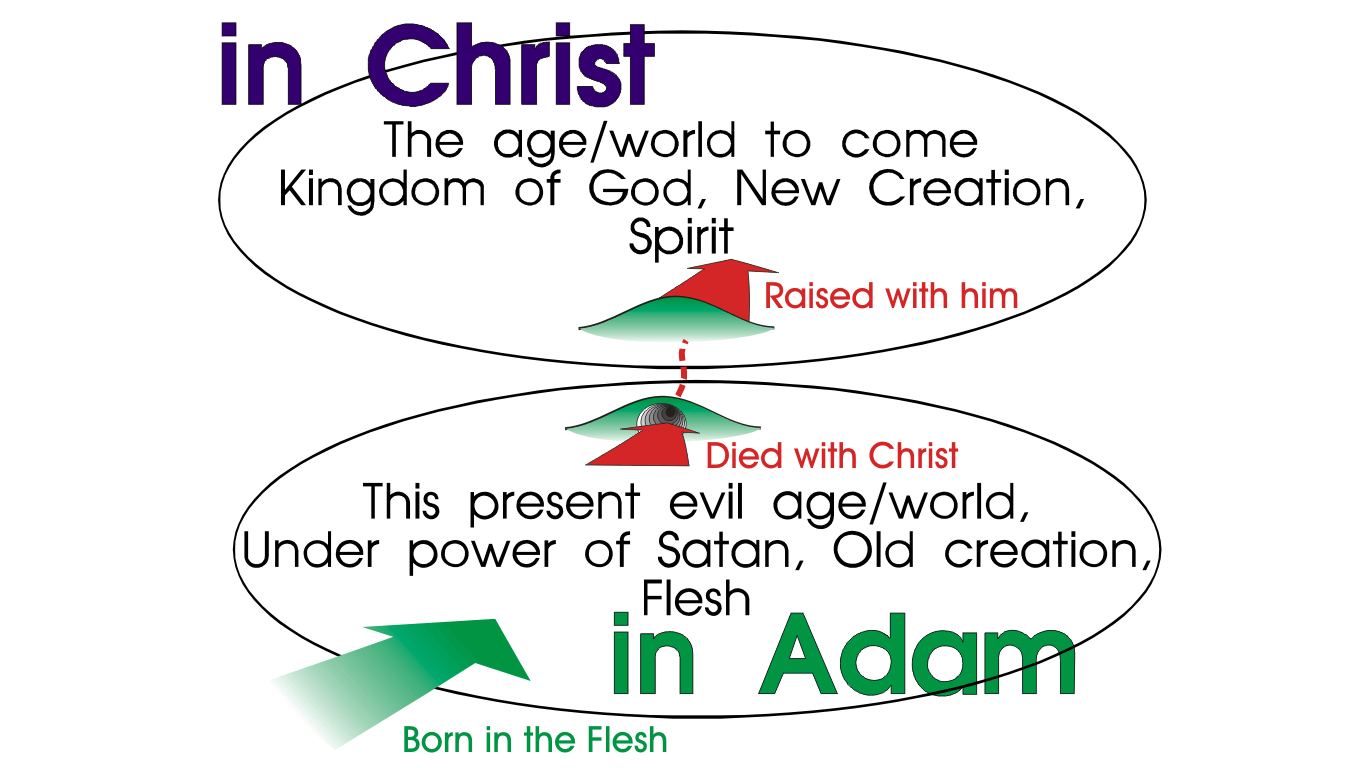Andrew Fountain - Bringing Heaven down into Family & Relationships
- Artist: Andrew Fountain
- Title: Bringing Heaven down into Family & Relationships
- Album: Newlife Church, Toronto
- Track: 9
- Genre: Colossians
- Year: 2016-11-13
- Length: 47:29 minutes (19.05 MB)
- Format: MP3 Stereo 44kHz 56Kbps (VBR)
Link to Video:
Bringing Heaven down into Family & Relationships - See the whole Colossians Series

Sermon notes - Bringing Heaven down into Family & Relationships
0. The Story so far
- There are some damaging errors creeping into the churches in this area
- Instead of answering them 1 by 1, Paul’s responds by making sure they understand the truth
- He gives a beautifully compact and exquisitely constructed presentation of Jesus and salvation
- He wrote it for more than just the Colossians —at the end he says “pass the letter on”.

- The first half is the roots
- Comes together in the trunk
- and the second half spreads out and brings fruit
- Two weeks ago I spoke about Union with Christ
- The second half of the book spreads out from this truth like ripples in a pond:
The Passage
1. Wives and Husbands
- If you’re not married, you needn’t switch off for this bit
- You may know someone who is married and you need to put them right
- But actually we’re going to see that the principle applies to all of us and in every relationship we have.
- Paul has just picked out six sample relationships, but I’ll show how it relates to all of them.
- This is a contentious subject today
- The problem is that there seems on the surface to be two contradictory teachings in the N.T.
- It seems to be saying that all distinctions are obliterated in Christ
- There is a contrast between the O.T. where women or gentiles were not allowed into the inner court of the temple
- and the N.T. where the dividing walls are broken down
- The gifts of the Spirit, such as prophecy and tongues, came on men and women indiscriminately.
- [Acts 21:9]—Philip had four daughters who prophesied
- Every single believer has gifts of the Spirit and functions as part of the body
- Not a male version of the Spirit and a female version...
- The New Covenant raises us all up to the same level, and we all come to God directly
- Jesus himself honoured women in a way that was culturally shocking, like talking to the Samaritan woman
- Yet on the other hand there are teachings that indicate some sort of difference, such as in
- and then there is this passage here.
- So what is going on here?
- One approach is to use this passage as an excuse for subjugating women
- Unfortunately this has been done in many cultures during much of history
- As we’ll see, this is not what the Bible is teaching
- A second approach is to say that this is cultural, and Paul is giving them rules within their culture
- Some of the commands are clearly cultural (holy kiss)
- But once you open that gate, it’s very hard to close it
- sex outside marriage, or even marriage itself
- Also, you have to see what the command is built on (e.g. holy kiss)
- if there is an underlying concept that can be transferred to our culture
- or if the context grounds the command in something outside culture
- The third approach is to carefully look at what it is really saying
- I said this was an apparent conflict
- One approach is to use this passage as an excuse for subjugating women
- I think there are two things we need to understand to resolve this conflict
- We need to understand exactly what the word “submit” means here
- It is a fundamentally different word to the one in v20 (children) and v.22 (bondservants)
- It means to voluntarily put yourself in a position where you are under someone’s leadership
- What really opens up this word is how it is used in 1 Cor 15:28
- So Jesus himself is voluntarily placing himself under the leadership of the Father as part of the great plan of salvation
- This brings us to the second point to understand—Jesus is equal to the father in every way
- so this submission is not about value or identity
- it is a temporary fitting-in with God’s purposes (no idea how this works out in heaven)
- that is why the word “fitting” is used (appropriate to God’s plan)
- It is not about “who we are” but about reflecting God’s plan
- It is not in any way a slavish relationship
- A board of directors all have a vote, but they elect a chairman, who has a casting vote
- so this submission is not about value or identity
- Let us be practical
- Marriage is a partnership
- Everything should be talked through, and every decision should be a joint decision
- It can be particularly hard if your parents were not good role models of doing this
- You are a unit, not two separate people, so behave like that
- e.g. I wouldn’t have brought us to Canada if Anne was not 100% behind it!
- I don’t say I want to go, you don’t but I’m going to have the casting vote and we’ll go.
- We only move in agreement. We behave as a unit
- A few years ago we had the roof replaced and she asked me which out of 3 colours I preferred
- It quickly became apparent that I didn’t have a real choice!
- But in that domain, I didn’t feel strongly so I was quite happy for her to choose
- We have different domains of expertise (replace her food mixer)
- But getting a car to replace our current vehicle is totally joint.
- In many areas she is very happy to let me make the decisions
- It is extremely rare that I use a “casting vote” to break deadlock between us.
- Before we got married, some family members joked that they were interested to see how our marriage would work out
- because we are both so strong-willed
- They said they wanted to see what would happen when the “irresistible force met the immovable object’
- but actually, it is extremely rare that we have anything even resembling a argument.
- To a large degree that’s because we have very similar likes and dislikes, and more important we both value the Kingdom above everything.
- But even if you are very different, you can still honour one another
- because we are both so strong-willed
Now what about husbands?
- The love here is agapao
- Three kinds of love (like concentric circles)
- agapao love is love that doesn’t require anything in return
- e.g. feeding a homeless person—we don’t normally do it to get something out of it
- phileo love enjoys the person
- e.g. hanging out with a friend, or a group of friends
- erao love is sexual desire
- quite appropriate between husband and wife
- agapao love is love that doesn’t require anything in return
- Now which kind of love should exist between husband and wife?
- all 3!
- So why does Paul only command the first, agapao
- partly because you actually can’t command the other two!
- But you can make a decision, that doesn’t depend on feelings, to love that person with a agapao love
- but mainly because you need the outer love before the inner love can flourish
- partly because you actually can’t command the other two!
- For what this means, we cannot do better than to go to the parallel passage in
Ephesians 5:21–33
- submitting to one another out of allegiance to Christ.
- Wives … to your own husbands, as to the Lord.
- For the husband is the head of the wife
even as Christ is the head of the church,
he is saviour of the body - But as the church submits to Christ,
so also should wives … to their husbands in everything.
- Husbands, love your wives,
as Christ loved the church
and gave himself up for her, - that he might make her holy,
cleansing her by the washing of water in the word, - that he might present to himself the church,
in splendor, without spot or wrinkle or any such thing,
that she might be holy and without blemish. - In the same way husbands should love their own wives
as their own bodies.
He who loves his own wife loves himself. - For no one ever hated his own flesh,
but nourishes and cherishes it,
just as Christ does the church, - because we are members of his body.
- “Therefore a man shall leave his father and mother
and hold fast to his wife,
and the two shall become one flesh.” - This mystery is profound,
and I speak with reference to Christ and the church. - However you, each one of you should so love his own wife as himself,
and the wife should respect her husband.
NET Bible
- This parallel is a bit much, don’t you think guys?
- It means a cost on a physical level
- It means being sensitive and sacrificial
- It means sometimes missing out on what you want to do for the sake of the other person
- We all look after what is important to us
- your car, your career, your house, your interests, your finances
- your relationship with your wife is the most valuable thing you have
- we might “cherish” a car by carefully polishing it and giving attention to problems
- we cherish the relationship with our wives in a similar way, with care and sensitivity
- the word “mean” literally means “unpleasant & nasty” (bitter sounds like an emotion, but means forcing a bitter taste on them)
- I know a husband who can sometimes speak so crossly to his wife, it is almost a “verbal wife-beating”
- What if there are problems?
- If you have the most wonderful wife in the world, it’s easy to love them
- If you have an incredibly wise and capable husband, it’s easy to submit
- But what if they are a jerk?
- Larry Crabb: Wedding vows story
- what are people really promising? (especially if they don’t know Christ)
- Harsh and mean husband—should you still submit?
- Contentious and shrill wife—should you still love her?
- If you only follow this passage when it’s easy, you’re not really following it!
- The command doesn’t say “Love your wife and then she’ll love you back and it will feel good”
- If that is your motive, then ultimately you are manipulative
- Only when you love her unconditionally, irrespective of her response, are you letting her response out of free will
- What if the husband beats his wife?
- She should not allow it to continue
- It may well mean reporting him to the authorities
- It may mean separating from him if he won’t change
- What if the husband is not a believer and orders his wife not to go to church?
- There is a conflict between God’s commands and the husbands
- She should not be provocative, but ultimately she cannot keep away from God’s people
- But there may well need to be a lot of sensitivity
- Many times love and wisdom can win a husband or wife around
- But ultimately your spouse may leave you:
- I believe that desertion is a legitimate ground for divorce, although of course it is very much a last resort when everything else has failed.
- One the other hand, what men really value is respect from their wives
- some women are always badmouthing their husbands, in a jokey way
- Even if it is hard to respect an unbelieving husband
- sometimes respecting them will actually make them start to live more responsibly!
2. Children and Parents
- Notice that children are addressed as part of the congregation here!
- You can imagine this letter from Paul arriving in Colosse
- It is read out on a Sunday Morning in church
- Paul doesn’t say “when the kids get back from their kids’ church, tell them this...”
- of course we do need to have kids’ church,
- but Paul is elevating them to responsible members of the church
- The word here is referring to pre-adults
- Some people teach that you have to obey “your parents in everything” till the day you die (or they do)
- But it is clear from Galatians that in those days there was a radical change when the child came of age
- People still need to honour their parents, of course
- “crushed in spirit” literally no-spirit —it has been crushed out of them
- Have you ever met children like that who have been treated so harshly they have no spirit in them
- I was at a boys camp in Canada (mostly from non-Christian homes) where I was asked to speak on the subject of anxiety
- I did a questionnaire—what are you most afraid of
- the most common answer was their parents
- Men come of pretty negatively here—tend to be mean to their wives and provoke their children!
- “Fatherless generation” (either absent or a bad representation of fatherhood)
- Makes it hard to relate to God as Father
- The plural word can sometimes mean parent (Heb 11:23 Moses was hidden by his “fathers” = parents)
- So this could equally apply to mothers
3. Bondservants and Masters
- leave till next time
The Two Worlds
- How does this relate to the rest of the book?
- We can feel that because we are now a new creation, living in a spiritual dimension
- that we don’t have responsibilities in this world
- The Two Worlds
- You get from here to hear by trusting in Jesus...
- I heard someone say that they didn’t need to pay back a debt their owed to their mother because Jesus had paid all their debts
- Do wives who are free in Christ still need to submit to husbands,
- or children to parents?
- But we are still actually living in this world!
- Look at how often “in the Lord” appears in the passage
- (I have translated it Master in the second part for reasons I will explain next time!)
- But it means the same as “in Christ” —now are you beginning to see?
- The only motivation that Paul gives for living in the right way down below is that we also exist “in Christ”
- When Jesus is in all our relationships, we are actually bringing a touch of the age to come into this age
- a bit of heaven come down
- Outsiders see a community that is living by the rules of a different Kingdom
- That has Christ permeating everything
- (I have translated it Master in the second part for reasons I will explain next time!)
Mutual Submission
- Paul has selected six relationships here, but the same principle applies to all
- We submit our self-interests to others
- Christ on the cross, revealing what pleases the Father
- When we put the interests of others before our own, then we show the life of Jesus in us
- We cannot actually live this way without him being in us!
- Let’s end by looking back at that Ephesians passage and praising Jesus for what he has done in setting us an example!
- Let’s get our eyes fixed on Jesus as a motivation and read Eph 5:25–30 together:
Ephesians 5:21–33
Updated on 2016-11-14 by Andrew Fountain
- Login to post comments
- Download audio file
- 109 downloads
- 4 plays





